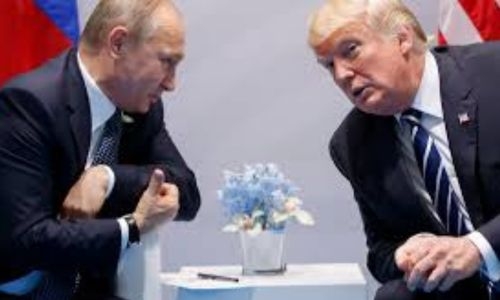Trump Proposes 800-Mile Buffer Zone in Ukraine, Aligning with 'America First' Doctrine and Excluding US Troops
TDT | US
The Daily Tribune – www.newsofbahrain.com
Email:editor@newsobahrain.com
In a major shift in U.S. foreign policy, President-elect Donald Trump announced plans to establish an 800-mile buffer zone in Ukraine, to be monitored by European troops, explicitly stating that American forces will not be deployed in this effort. Trump's latest initiative is framed within his "America First" policy, emphasizing a reduced U.S. military footprint abroad. This new approach raises concerns among NATO allies and could significantly alter the dynamics of the ongoing conflict between Russia and Ukraine, potentially undermining the longstanding unity and effectiveness of the alliance.
During a recent press conference, Ukrainian President Volodymyr Zelensky expressed his alarm regarding the implications of Trump's victory. He emphasized that it would be "unacceptable" for European leaders to make concessions to Russia, particularly as Moscow continues to insist on direct negotiations for peace. Amidst growing fears about future U.S. support for Ukraine, Zelensky highlighted the urgency of maintaining a solid front against Russian aggression. He congratulated Trump on an "excellent" call following the election, but uncertainty looms over the nature of American involvement moving forward.
Reports indicate that while the U.S. will provide additional military supplies to Ukraine, Trump’s administration will not commit troops to enforce the proposed buffer zone. A member of his team stated clearly, “We are not sending American men and women to uphold peace in Ukraine. And we are not paying for it. Get the Poles, Germans, British, and French to do it.” This stance has garnered considerable backlash from European security experts, particularly in the UK, where officials voiced concerns that a limited U.S. role could create vulnerabilities for Ukraine and inadvertently favor Russian territorial ambitions.
At a broader strategic level, Trump’s "America First" policy threatens to fragment NATO’s cohesion, as the U.S. has long played a critical role in coordinating defense efforts within the alliance. Current defense spending data reveals that the U.S. allocates nearly twice as much as all other NATO members combined, a factor that has underpinned the alliance's joint capabilities since its inception after World War II. Russian President Vladimir Putin has seized upon this uncertainty, ridiculing NATO’s dependency on U.S. leadership and suggesting that the alliance risks weakening its influence without strong American support.
As Trump embarks on a second term, he intends to maintain an insular approach to foreign policy, pledging to avoid new international conflicts. Analysts warn that this could perpetuate a cycle of reduced American engagement in global security matters, impacting conflicts like Russia's invasion of Ukraine. With Trump indicating a preference for high tariffs and stringent economic measures aimed at reducing trade deficits, the strategic landscape is set for a significant transformation. As his administration implements these policies, both allies and adversaries will closely monitor the evolving situation, particularly regarding the repercussions for Ukraine and the stability of NATO’s collective response to Russian aggression.
Related Posts

